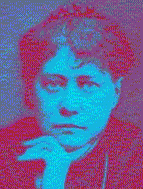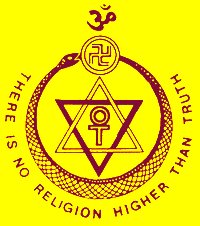The Key to Theosophy

Helena
Petrovna Blavatsky
1831
-1891
_______________________
The Key to Theosophy
By
Helena Petrovna Blavatsky
On Individuality and Personality
Q. But what is the difference between the two?
A. Even Col. Olcott, forced to it by the logic of Esoteric philosophy, found
himself obliged to
correct the mistakes of previous Orientalists who
made no
such distinction,
and gives the reader his reasons for it. Thus he says:
The successive appearances upon the earth, or "descents into
generation," of the tanhaically coherent parts
(Skandhas) of a certain being, are a succession of
personalities. In each
birth the personality differs from that of a previous or
next succeeding
birth. Karma, the deus ex machina,
masks (or shall we say
reflects?) itself now in the personality of a sage, again as an
artisan, and so
on throughout
the string of births. But though personalities ever shift, the one
line of life
along which they are strung, like beads, runs unbroken; it is ever
that particular
line, never any other. It is therefore individual, an individual
vital undulation,
which began in Nirvana, or the subjective side of nature, as
the light or
heat undulation through aether, began at its dynamic
source; is
careering through the
objective side of nature under the impulse of Karma and
the creative
direction of Tanha (the unsatisfied desire for
existence); and
leads through many
cyclic changes back to Nirvana. Mr. Rhys-Davids calls
that
which passes from
personality to personality along the individual chain
character, or doing.Since character is not a mere metaphysical
abstraction, but
the sum of one's
mental qualities and moral propensities, would it not help to
dispel what Mr.
Rhys-Davids calls "the desperate expedient of a
mystery" if we
regarded the
life-undulation as individuality, and each of its series of natal
manifestations as a
separate personality? The perfect individual, Buddhist
speaking, is a
Buddha, I should say; for Buddha is but the rare flower of
humanity, without the
least supernatural admixture. And as countless generations
("four asankheyyas
and a hundred thousand cycles,") are required to develop a
man into a
Buddha, and the iron will to become one runs throughout all the
successive births, what
shall we call that which thus wills and perseveres?
Character? One's
individuality: an individuality but partly manifested in any
one birth, but
built up of fragments from all the births?
Q. I confess that I am still in the dark. Indeed it is just that
difference,
then, that you
cannot impress too much on our minds.
A. I try to; but alas, it is harder with some than to make them
feel a reverence
for childish
impossibilities, only because they are orthodox,and
because
orthodoxy is
respectable. To understand the idea well, you have to first study
the dual sets of
principles: the spiritual,or those which belong to
the
imperishable Ego; and the
material,or those principles which make up the
ever-changing bodies or
the series of personalities of that Ego. Let us fix
permanent names to
these, and say that:
1. Atma, the "Higher Self," is neither your Spirit nor
mine, but like sunlight
shines on all. It
is the universally diffused "divine principle," and is
inseparable from its one
and absolute Meta-Spirit, as the sunbeam is inseparable
from sunlight.
2. Buddhi (the spiritual soul) is only its vehicle. Neither each
separately, nor
the two
collectively, are of any more use to the body of man, than sunlight and
its beams are
for a mass of granite buried in the earth, unless the divine Duad
is assimilated
by, and reflected in, some consciousness.Neither Atma
nor Buddhi are ever reached by Karma, because the former is the highest aspect
of Karma, its working agentof itself in one aspect,
and the other is unconscious on this plane. This consciousness or mind is,
3. Manas, the derivation or product in a reflected form of Ahankara, "the
conception of I," or
Ego-ship. It is, therefore, when inseparably united to the
first two, called
the Spiritual Ego, and Taijasi (the radiant). This is
the real
Individuality, or the
divine man. It is this Ego which-having originally
incarnated in the
senseless human form animated by, but unconscious (since it
had no
consciousness) of, the presence in itself of the dual monad-made of that
human-like form a real man.Mahat or the "Universal Mind" is the source
of Manas. The latter is Mahat, i.e., mind, in man.
Manas is also called Kshetrajña, "embodied
Spirit," because it is, according to our philosophy, the Manasaputras,or "Sons of the Universal Mind," who
created,or rather produced, the thinking man, "manu," by incarnating in the third Race mankind in our
Round. It is Manas, therefore, which is the real incarnating and permanent
Spiritual Ego, the individuality, and our various and numberless personalities
only its external masks.
It is that Ego, that "Causal Body," which overshadows
every personality Karma
forces it to
incarnate into; and this Ego which is held responsible for all the
sins committed
through, and in, every new body or personality-the evanescent
masks which hide
the true Individual through the long series of rebirths.
Q. But is this just? Why should this Ego receive punishment as the
result of
deeds which it has
forgotten?
A. It has not forgotten them; it knows and remembers its misdeeds
as well as you remember what you have done yesterday. Is it because the memory
of that bundle of physical compounds called "body" does not recollect
what its predecessor (the personality that was) did, that you imagine that the
real Ego has forgotten them? As well say it is unjust that the new boots on the
feet of a boy, who is flogged for stealing apples, should be punished for that
which they know nothing of.
Q. But are there no modes of communication between the Spiritual
and human
consciousness or memory?
A. Of course there are; but they have never been recognized by your
scientific
modern
psychologists. To what do you attribute intuition, the "voice of the
conscience,"
premonitions, vague undefined reminiscences, etc., etc., if not to
such
communications? Would that the majority of educated men, at least, had the fine
spiritual perceptions of Coleridge, who shows how intuitional he is in some of
his comments. Hear what he says with respect to the probability that "all
thoughts are in themselves imperishable."
If the intelligent faculty (sudden 'revivals' of memory) should be
rendered more
comprehensive, it would
require only a different and appropriate organization,
the body
celestial instead of the body terrestrial, to bring before every human
soul the
collective experience of its whole past existence(existences, rather).
And this body celestial is our Manasic Ego.
__________________________

Find answers to more questions
with
these Theosophy links
Dave’s
Streetwise Theosophy Boards
The Theosophy Website that
Welcomes Absolute Beginners
If you run a Theosophy Study Group,
please feel free
to make use of the
material on this Website
The Most Basic Theosophy
Website in the Universe
A quick overview of Theosophy
and the Theosophical Society
If you run a Theosophy Study Group you
can use this as an introductory handout.

Cardiff Theosophical Society meetings
are informal
and there’s always a cup of tea afterwards
The
Cardiff Theosophical Society Website
The
National Wales Theosophy Website
This is for
everybody not just people in Wales
Theosophy Cardiff’s Instant Guide
General pages
about Wales, Welsh History
and The History of
Theosophy in Wales
Independent Theosophy Blog
One liners and quick explanations
About aspects of Theosophy
H P Blavatsky is usually the only
Theosophist that most people have
ever
heard of. Let’s put
that right
Lentil burgers, a
thousand press ups before breakfast and
the daily 25 mile
run may put it off for a while but death
seems to get most of
us in the end. We are pleased to
present for your
consideration, a definitive work on the
subject by a Student of
Katherine Tingley entitled
An
Independent Theosophical Republic
Links to Free Online Theosophy
Study Resources; Courses, Writings,
No
Aardvarks were harmed in the
The Spiritual Home of Urban Theosophy
The Earth Base for Evolutionary Theosophy
Classic Introductory
Theosophy Text
A Text Book of Theosophy By C
What Theosophy Is From the Absolute to Man
The Formation of a Solar System The Evolution of Life
The Constitution of Man After Death Reincarnation
The Purpose of Life The Planetary Chains
The Result of Theosophical Study
An Outstanding
Introduction to Theosophy
By a student of
Katherine Tingley
Elementary Theosophy Who is the Man? Body and Soul
Body, Soul and Spirit Reincarnation Karma
Preface
Theosophy and the Masters General Principles
The Earth Chain Body and Astral Body Kama – Desire
Manas Of
Reincarnation Reincarnation Continued
Karma Kama Loka
Devachan
Cycles
Arguments Supporting Reincarnation
Differentiation Of Species Missing Links
Psychic Laws, Forces, and Phenomena
Psychic Phenomena and Spiritualism
Quick Explanations with Links to More
Detailed Info
What is Theosophy ? Theosophy Defined (More Detail)
Three Fundamental Propositions Key Concepts of Theosophy
Cosmogenesis
Anthropogenesis
Root Races
Karma
Ascended Masters After Death States
Reincarnation
The Seven Principles of Man Helena Petrovna Blavatsky
Colonel Henry Steel Olcott William Quan Judge
The Start of the Theosophical Society Theosophical Society Presidents
History of the Theosophical Society Glossaries of Theosophical Terms
History of the Theosophical Society in Wales
The Three Objectives of the Theosophical Society
Explanation of the Theosophical Society Emblem
Karma Fundamental Principles Laws: Natural and Man-Made The Law of Laws
The Eternal Now
Succession
Causation The Laws of Nature A Lesson of The Law
Karma Does Not Crush Apply This Law
Man in The Three Worlds Understand The Truth
Man and His Surroundings The Three Fates The Pair of Triplets Thought, The Builder
Practical Meditation Will and Desire
The Mastery of Desire Two Other Points
The Third Thread Perfect Justice
Our Environment
Our Kith and Kin Our Nation
The Light for a Good Man Knowledge of Law The Opposing Schools
The More Modern View Self-Examination Out of the Past
Old Friendships
We Grow By Giving Collective Karma Family Karma
National Karma
India’s Karma
National Disasters
Try these if you are looking
for a
local Theosophy Group or Centre
UK Listing of Theosophical Groups